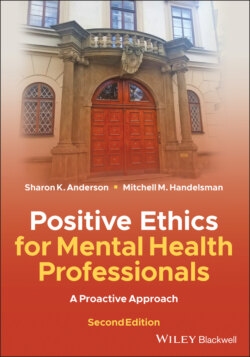Читать книгу Positive Ethics for Mental Health Professionals - Sharon K. Anderson - Страница 38
Journal Entry: Ethics Autobiography—Part 1
ОглавлениеPut the following on the top of a new page in your journal: Name, date, where you are in your professional journey (graduate school, employment, newly licensed, etc.), and anything else that will help make a connection for you about the time and place of this journal entry.
Here are some questions that form the basis of your ethics autobiography. You need not address them all, or in order. After all, it’s your autobiography. You might want to refer to some of your previous journal entries, but feel free to go beyond them and integrate them.
1 What personal needs will be met (or are being met) by becoming (being) a psychotherapist? What is your sense of why those needs exist?
2 What motivations, values, virtues, and social identities are most important to you, as a person, in your relationships with other people?
3 What are the origins of these motivations, values, virtues, etc.? Take some time on this one. For example, how did you learn about values and develop them? How did you acquire the motivations you have for being a psychotherapist?
4 What drives your notions of right and wrong? You might draw upon a story about yourself that highlights your sense of right and wrong behavior. Tell the story—what actually happened—and describe how you thought about right and wrong. You might want to discuss how the story would have gone if a similar situation arose in a different context, and how and why you might behave differently.
5 In terms of your social identities, how similar are your needs, motivations, values, and virtues to those of other members of the cultures to which you belong? Here, you can think broadly about culture. Mitch, for example, belongs to the cultures of trumpet players, contact lens wearers, and full professors.
6 What experiences have you had with members of cultures to which you do not belong and their notions of right and wrong? What feelings did you have about those experiences and about the members of those other cultures?
7 At this stage in your professional journey, what would you consider examples of right and wrong professional behavior?
8 Where do your ideas of right and wrong professional behavior come from?
9 How might your motivations, values, virtues, and social identities that you wrote about in questions 1–3 influence your decisions about right and wrong professional behavior?
10 As you’ve answered the preceding questions, what thoughts and feelings are stirred in you? How do your journal entries about needs, motivations, and values sound now as you re-read them?
What you’ve written is the beginning of a rough draft of your autobiography. Your autobiography, like your growth and development as a professional, will never be finished; your experiences, thoughts, and perspectives will change over time. So keep this portion of your journal accessible, as you will have occasion to refer back to it, reconceptualize it, and revise it many times.
